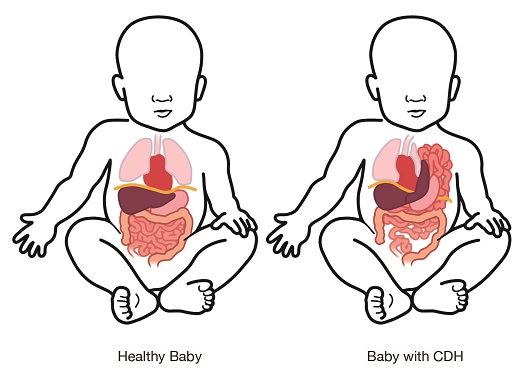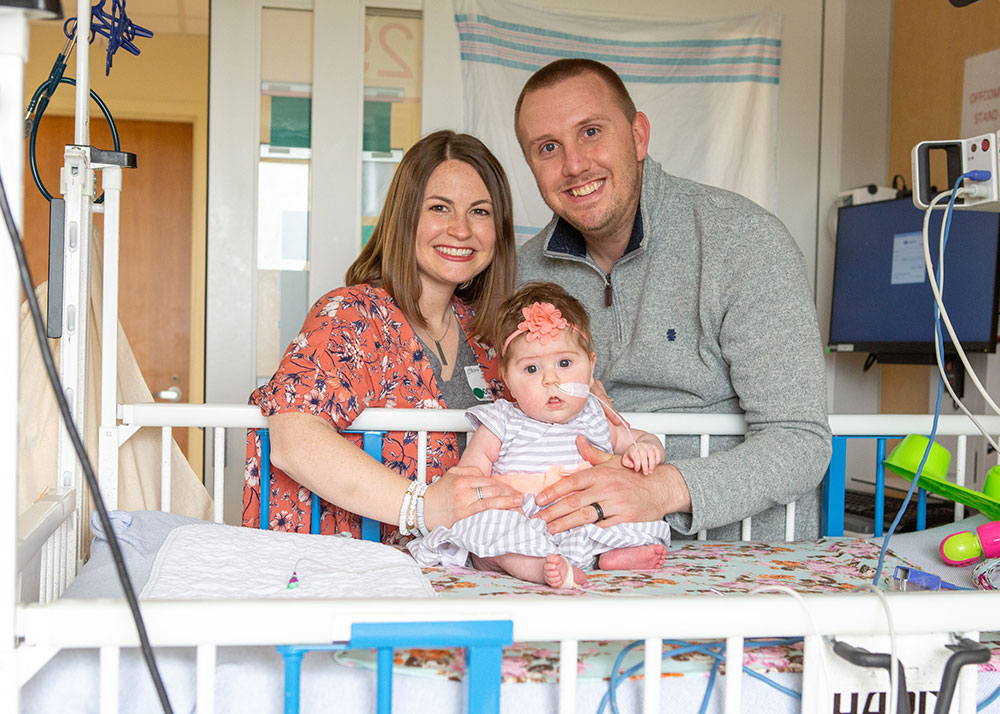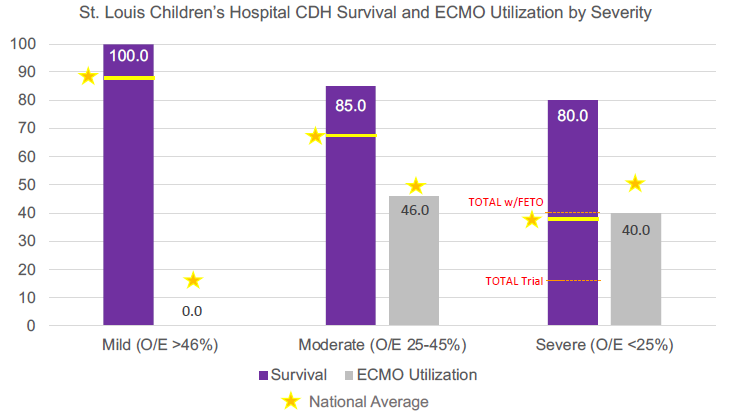Receiving an unexpected diagnosis for your baby is challenging, and we are here to help you.
The diagnosis of a congenital diaphragmatic hernia (CDH) in your unborn baby is an unexpected and life-changing event. Our Fetal Care Center team is here to provide hope, compassion, and expertise to join this journey with you. Our dedicated and supportive care team includes:
- Maternal-Fetal Medicine Physician
- Pediatric Surgeon
- Neonatologist
- Nurse Coordinator
- Social Worker
This team will support your family throughout this journey, help you understand treatment options, and guide you when making health care decisions for your baby.
What is Congenital Diaphragmatic Hernia (CDH)?
CDH is a birth defect that happens early in a pregnancy. It occurs when a hole in the diaphragm forms and allows abdominal organs to move into the chest. The abdominal organs compress the chest, and that makes it harder for the lungs and heart to grow properly.
The lungs on both sides do not have room to develop normally, causing pulmonary hypoplasia, or small lungs. This will make it hard for your baby to breathe after birth. The small lungs have blood vessels that become abnormally thickened and highly reactive. This is called pulmonary hypertension, and it makes it hard for your baby to deliver oxygen to their body. This condition is treated with oxygen, medicine, and some severe cases may require ECMO, a type of life support that temporarily replaces the function of the heart and lungs.
Learn more about CDH.

Congenital Diaphragmatic Hernia Treatment: Why Choose the Fetal Care Center?
When you chose the Fetal Care Center, you are choosing the best option for you and your baby.
- Integrated care for you and your baby: We are the only medical center in St. Louis to offer the highest level of specialized care for mom and baby in a single location. Our birthing suites and mother-baby rooms are connected to our Level IV Newborn Intensive Care Unit (NICU), so you stay close to your baby when they go to the NICU. No other medical center in St. Louis offers that convenience and assurance.
- Prenatal expertise: Specialists at the Fetal Care Center are experts in CDH diagnosis and treatment. Successful diagnosis and treatment of CDH over the course of your pregnancy requires a dedicated team approach starting when the baby is still in the womb.
- The St. Louis region’s first and only NICU CDH-specific team: Your baby will receive personalized, family-centered care by a team of specialists, including neonatal intensive care doctors, pediatric surgeons, and nurses, who are experts in caring for you and your infant with CDH without having to travel beyond the Midwest region. Learn more about the CDH team.
- Excellence in outcomes: Over the past five years, nearly 90% of all infants with CDH we have cared for have survived. This is higher than the national average of 70%.
- Experienced Extracorporeal Membrane Oxygenation (ECMO) support: Babies with CDH have a high likelihood of needing life support from ECMO, a heart-lung bypass machine. St. Louis Children’s Hospital care for the highest number of neonatal ECMO patients in the region each year and is an Extracorporeal Life Support Organization (ELSO) Platinum Level Center of Excellence for ECMO.
- Personalized, consistent care that goes beyond the NICU: Babies with CDH often need extra support throughout childhood. The same doctors who cared for your baby in the NICU will continue to support him or her once they are discharged home, collaborating with you and their pediatrician to ensure they are meeting their developmental milestones.
What to Expect
Before Birth: Diagnosis & Prenatal Care
At your first visit with our fetal care team, we will discuss your baby’s CDH diagnosis. We’ll speak with you about what kind of care to expect, and we will do tests to understand how severe the CDH may be. This testing is a guide for you and your providers. The tests can’t always predict how sick your baby will be, and we won’t fully know until after your baby is born. Initial testing includes:
- High-resolution ultrasound
- Fetal MRI
- Genetic testing
- Fetal heart ultrasound
Learn more about high-risk pregnancy tests.
The same day as your first evaluation, you will meet with a maternal-fetal medicine specialist, an expert in prenatal diagnosis and care for pregnancies complicated by CDH. You will also meet with a neonatologist who specializes in caring for your baby after delivery. These providers will review pregnancy management options with you and your support team. In severe cases, there may be options for interventions before birth, but most treatments will take place after delivery.
During your pregnancy care, you will have multiple ultrasounds to monitor how the CDH changes as the baby grows, along with close fetal monitoring to check for any signs of complications. These tests are essential for predicting the resources and interventions your baby may need after delivery. We will provide you and your support team with the most up-to-date information to help guide conversations about care, set goals, and to make sure you have the information needed to make important decisions along the way.
Safe Birthing Experiences and Care After Birth
Research shows that CDH babies have the best chance of survival when they are born at a hospital that specializes in high-risk pregnancies, like Barnes-Jewish Hospital and St. Louis Children’s Hospital. It is also important that all CDH babies have immediate access to advanced newborn care, including Extracorporeal Membrane Oxygenation (ECMO), because no one can predict how much support any CDH patient may require before birth. If born at a hospital without these capabilities, the transfer of these very fragile infants can significantly worsen pulmonary hypertension and negatively impact outcomes.
Most deliveries of babies with CDH can be performed vaginally. Our high-risk obstetrics team will meet with you throughout your pregnancy and learn about and discuss your desired birth experience, including labor pain management options, while ensuring a safe delivery for you and your baby.
During delivery, a dedicated CDH medical team from St. Louis Children’s Hospital will be in the room to care for your baby. We always plan for delay cord clamping after delivery to allow for skin-to-skin contact between you and your baby, promoting bonding. However, once the cord is clamped, the CDH team will need to assess your baby and arrange to send your baby to our level IV newborn intensive care unit (NICU), which is directly connected to the labor and delivery unit by a short bridge.
Your support person can accompany your baby to the NICU, but it is important for Mom’s condition to be assessed by her obstetrics team before she can join the baby in the NICU. We make every effort to reunite mom and baby as quickly as it is safe to do so.

NICU Stay
In the newborn intensive care unit (NICU) at St. Louis Children’s Hospital, the dedicated CDH team and full range of subspecialists and therapy services will continue to care for your baby every day until your baby is discharged from the hospital. Research has shown that infants with CDH have better lung, heart, and brain outcomes with a specialized and dedicated care team. This CDH team includes:
- Neonatologists
- Pediatric Surgeons
- Neonatal Nurse Practitioners
- A specialized CDH Nursing team
- Registered Dietitian
- Physical, Occupational, and Speech Therapists
All infants with CDH will require surgery soon after birth to fix the hole in the diaphragm and return the organs to the abdomen. Your baby’s surgeon will work with the NICU team to determine the optimal timing of repair surgery.
While your baby heals and their lungs grow, they will stay in the NICU and receive specialized care and support as they learn to breathe, eat, and grow on their own. The length of the NICU stay can vary from weeks in very mild cases, to several months for infants with more severe CDH.
It’s important to know that there are typically challenges at every stage of CDH care, both before and after repair. All team members work together to educate and involve families with care and compassion at every step, so that you have access to the information you need in case difficult decisions need to be made.
While your baby is in the NICU, if you want to provide breastmilk to your baby, you’ll have access to Barnes-Jewish Hospital and St. Louis Children’s Hospital lactation consultants to support all methods of feeding. We can store your breastmilk until your baby can receive it.
From NICU Discharge through Childhood
The team-focused approach at St. Louis Children’s Hospital continues after your baby is ready to go home. Along this journey, we will update and work with your child’s primary care physician to ensure your baby receives the support he or she needs to thrive. We offer a multidisciplinary CDH Long-Term Follow Up clinic that organizes and coordinates the different subspecialists that a child who was born with CDH may need to grow and lead healthy, productive lives. The team includes:
- Neonatology
- Pediatric Surgery
- Pulmonology
- Neurology
- Physical, Occupational, and Speech Therapy
- Registered Dietitian
While we encourage you to enroll in our long-term follow-up program at St. Louis Children’s Hospital, we recognize that not all families may live close enough to do so. If similar services can be provided closer to home, we will help connect you to an appropriate program, if you wish.
Regardless, we want to know how you and your child are doing, and a coordinator will be in touch to check on you both, serve as a resource, and help to arrange the necessary neurodevelopmental testing, in coordination with your local physicians.
Excellence in Survival
The national average for CDH survival remains around 73%. Our rigorous, inclusive, and detail-oriented approach to CDH care at St. Louis Children’s Hospital has produced survival rates that are far better than the national average. Over the past 5 years, 89% of all our CDH patients have survived. Even our sickest patients have a survival rate of 80%, and 60% of these patients can avoid ECMO.
Our team-based approach, along with the specialized training and expertise of your baby’s bedside nurses in the NICU, advanced practice providers, and physicians caring for your baby, serves as a model for how years of study, refinement, and a highly systematic approach to CDH care can dramatically improve outcomes for these complex patients.
A current best practice, “gentle ventilation,” was pioneered at St. Louis Children’s Hospital. Our careful attention to lung protection ensures that our infants can leave the NICU with the healthiest lungs possible. CDH families should know that they are not alone on this journey. Our team takes the time to learn about each patient and their family to provide the best care with compassion and expertise.

Contact Us
To make an appointment with a WashU Medicine fetal care specialist at the Women & Infants Center, call 866-867-3627.